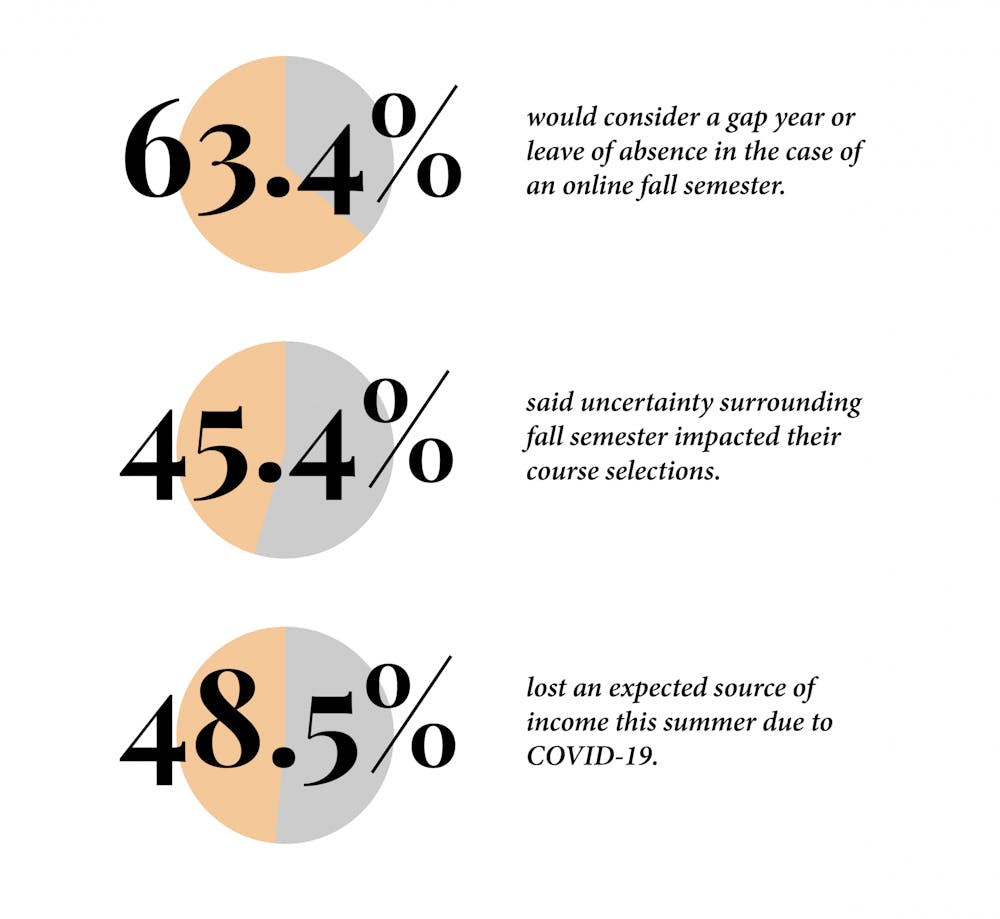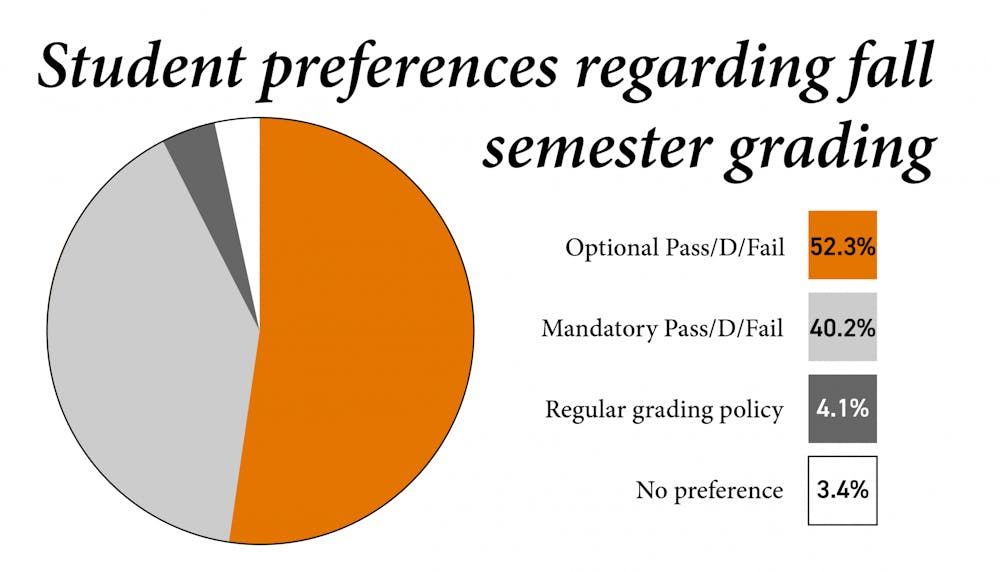According to a campus-wide survey conducted in early May by the Undergraduate Student Government (USG), 63.4 percent of student respondents said they would seriously consider taking a leave of absence or a gap year if the fall semester were held remotely and online.
Earlier this month, however, Dean of the College Jill Dolan confirmed that the University could not guarantee immediate return to students who take gap years this fall. As an online fall semester becomes increasingly probable, colleges across the country are bracing for a surge of students seeking to take a year off.
The survey results, released on Saturday, were based on 2,237 total responses and included student feedback on a wide range of issues regarding the COVID-19 crisis’ impact on academics and student life. Each survey question was optional, so each had a different number of total respondents. The University’s total undergraduate population is 5,428 students.
Some of the potential gap year plans students shared in the survey included internships, paid work, remote research, independent study, online courses at other institutions, preparing for graduate school entrance exams like the GRE and the MCAT, volunteering, personal projects, hiking, biking, traveling, and visiting family abroad.
In terms of grading policy, the survey found that if the fall semester is held online, 52.3 percent of student respondents would prefer the grading system to be optional pass/D/fail, 40.2 percent would prefer mandatory P/D/F, and 4.1 percent would prefer a return to typical grading policy.
Those students in favor of mandatory P/D/F for the fall cited equity concerns such as inconsistent WiFi access, lack of adequate workspace, and family situations or emergencies, according to the USG report. Those students also expressed concern about perceptions of an elected P/D/F under an optional P/D/F policy by graduate programs, such as medical school.
Proponents of the optional P/D/F policy also referenced graduate program admissions and the need to improve grades before applying to those programs as reasons to prefer their policy. Those students explained that having the choice to opt for P/D/F this spring already significantly reduced stress.
In the event a traditional on-campus fall semester is not possible, 57.8 percent of students would prefer an “on-campus semester with significant social distancing protocols, barring legal restrictions,” while 34 percent would prefer a delayed on-campus semester with potentially fewer social distancing protocols and 7.2 percent would prefer an online, remote fall semester.

The USG report stated that a majority of students would prefer to be on campus in any form and would be willing to follow social distancing regulations to do so. Some students suggested an “optional-remote” semester, in which at-risk students could choose to take classes remotely and professors can opt to teach classes virtually.
If the fall is remote, students with lab theses in particular advocated for their permission to stay on campus in order to work on their independent work.

The survey also found that for 45.4 percent of respondents, uncertainty around the fall semester impacted the way in which they selected courses, while 54.6 percent stated it did not.
Students’ incomes were significantly impacted by the pandemic, the USG report found. Around 48.5 percent of students indicated that COVID-19 caused them to lose income they were expecting to gain over the summer.
If the fall semester were held online, 65.2 percent of students said they would be interested in virtual employment opportunities through the University, a figure comparable to the 67.3 percent of students who indicated they would be interested in student employment if the semester is on campus and to the 67.9 percent of students who stated that regardless of the status of the semester, they intended to hold employment in the fall of 2020, either through the University or externally.
For summer 2020, 35.3 percent of respondents said their plans were cancelled and they have not yet arranged new plans, and 18.7 percent said they managed to arrange new plans despite their original plans being cancelled.
Some students whose summer plans were impacted expressed worry about mental health issues arising as a result of “long, unstructured periods of time, including apprehensions about adjusting back to the pace of Princeton in the fall after an unstructured summer,” according to the report.
Many rising seniors indicated that they are now having to either “rethink or abandon their planned topic” because the crisis has disrupted their original intentions for summer thesis research.
In reflecting on virtual learning in the spring semester, only 2.2 percent of students found they experienced “no change” in their overall learning experience when the semester went online. 30.2 percent of students said their learning was “somewhat impaired,” 48.9 percent said it was “generally impaired,” and 18.7 said it was “significantly impaired.”
Students were asked how many of their non P/D/F-only classes they were planning to opt for P/D/F in: 728 students opted for P/D/F in none, 741 opted for it in one class, 426 opted for it in two, 129 opted for it in three, and 119 opted for it in four or more classes.

In terms of independent work, only 1.5 percent of respondents stated they had opted to P/D/F their senior thesis and only 1.2 percent opted to P/D/F their senior comprehensive exam, oral defense, or equivalent.
Throughout the semester, 46.1 percent of students reported that they asked their professors for at least one personal extension on an assignment.
For 15.7 percent of students, none of their courses changed the way in which end-of-term work was administered and assessed, and for 37.6 percent of students none of their courses changed the grading rubric for end-of-term work.
Students reported difficulty accessing the University Library’s resources. Some of their specific issues included being unable to log into the library website, lack of availability of digital versions of print books that were required for classwork or independent work, and being unable to access senior thesis archives digitally.
The report also detailed a number of issues students had with the Zoom platform, as well as remote access to computing resources and programs.
For the spring term, 63.3 percent of students described feeling either “somewhat more stressed” or “substantially more stressed” as compared to past semesters.
Time zone differences were likely one significant stress factor for students. Students who were not located in the eastern time zone reported negative impacts on sleep schedules and overall decreases in amounts of sleep, significant focus issues and productivity losses associated with irregular sleep, difficulty finding convenient times to work on group assignments, lost learning opportunities because of frequently missed or recorded classes, difficulty accessing office hours, negative impacts on participation grades in precepts and seminars, missed deadlines associated with course registration and room draw, and family conflicts as a result of irregular class times and meals.
USG reported the demographic data of the survey respondents. All majors in both AB and BSE programs were represented; 505 respondents were first-generation, low-income students; 279 were international students; 323 were varsity athletes; 285 were pre-med; 291 were pre-law; and 980 were interested in other graduate programs.
The class of 2023 was most heavily represented in the survey, with 32.6 percent of survey respondents. The least represented was the class of 2020, with only 150 total responses recorded from the class year, constituting 6.8 percent of total respondents.
Editor’s Note: This piece has been updated to reflect Dean Dolan’s May 4 confirmation that the University could not guarantee immediate return following gap years.
Correction (June 2, 2020): This piece previously cited “short, inefficient appointment slots with the Data and Statistical Services center” as a finding of the USG report, which has since been amended to reflect that this finding was based on a sole respondent’s comment. The ‘Prince’ regrets the error.








